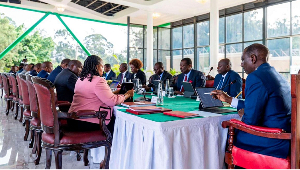The youth-led anti-tax protests that shook Kenya in the last two weeks of June appeared to have been finally contained, after President William Ruto withdrew the controversial Finance Bill and offered to engage the youth in talks, easing concerns about the situation degenerating into a full-scale revolution.
In the streets of Nairobi, where the protests first broke out on June 18, the number of protesters was smaller on the last day of the demos on Tuesday, compared to the scary scenes a week ago, when a crowd stormed Parliament and set part of it on fire.
Incidents of looting reported in various towns and cities also seemed to undermine the demos, handing the authorities the initiative in advancing its narrative that some bad actors had hijacked the movement and seeking to deligitimise its cause.
President Ruto, who has blamed opposition to the Finance Bill on communication failure, has in recent days has tried to counter negative public sentiment against his government.
On Friday, he engaged social media users in a three-hour conversation on X Space, which is one of the digital platforms where the protests were mobilised.
But analysts believe the three weeks of unrest, presents the Kenyan President with a much bigger problem than he would care to admit publicly.
“Without shoring up his legitimacy as well as that of the government, Ruto will struggle to get anything done for the rest of his term. Plummeting tax morale will upend his plans to achieve fiscal consolidation via better tax enforcement and make it virtually impossible to implement much-needed development plans,” wrote Ken Opalo, an Associate Professor in the School of Foreign Service at America’s Georgetown University, in an article analysing the Kenyan protests this week.
With the next elections only three years away and his soft underbelly exposed, the emergence of the Gen Z movement as a political force will also be weighing in his mind. Although the youth form a majority of Kenyans eligible to vote, widespread voter apathy among them has made campaign strategists to largely ignore them, preferring to target traditional voting blocs.
But having discovered their political power in the recent protests, with their success in forcing President Ruto to back down on the Finance Bill, their participation in the 2027 elections will most likely be higher.
Aside from their numbers, their savviness at using digital technology to mobilise around a cause poses a serious challenge for the country’s established polite elite, including the President, who are used to conventional campaign methods like addressing huge public rallies in stadiums and staging roadshows.
Kenya has one of the highest numbers of mobile phone subscribers in Africa, with the telecommunications regulator putting the mobile phone penetration rate at 127 percent by March this year.
The country is also a global leader in consumption of news on social media platforms like TikTok and YouTube, making it easy for digital activists to reach large audiences with relative ease.
For instance, an X-Space conversation hosted by a social media influencer at the peak of the recent protests to agitate for the release of one of the digital activists reportedly abducted by the police had an estimated 1.2 million users signing in.
Africa News of Saturday, 6 July 2024
Source: theeastafrican.co.ke

















